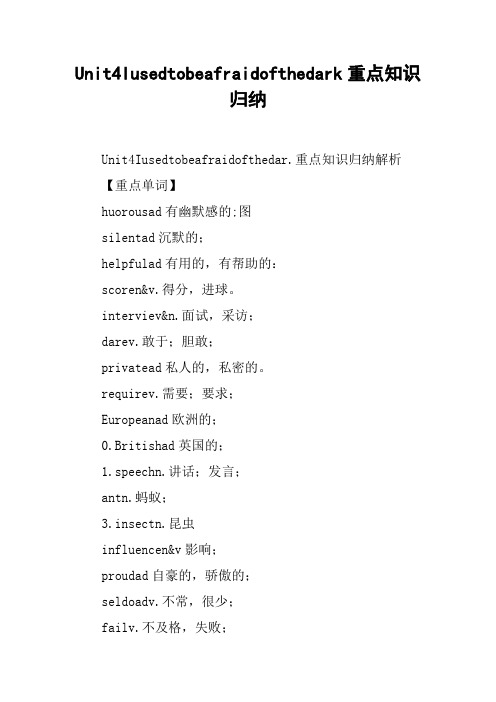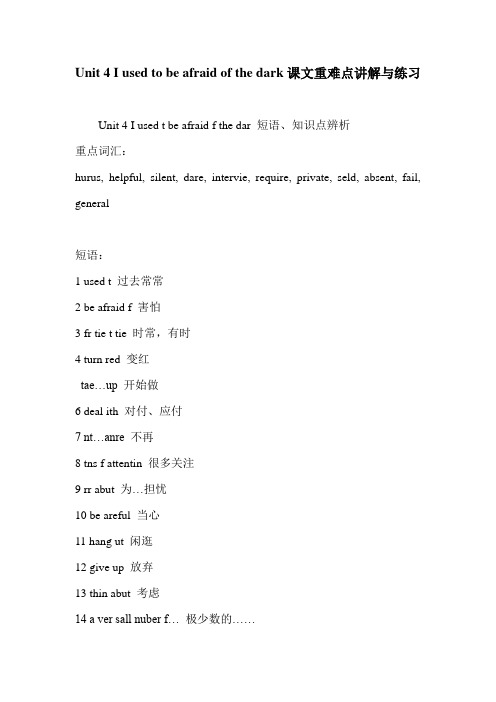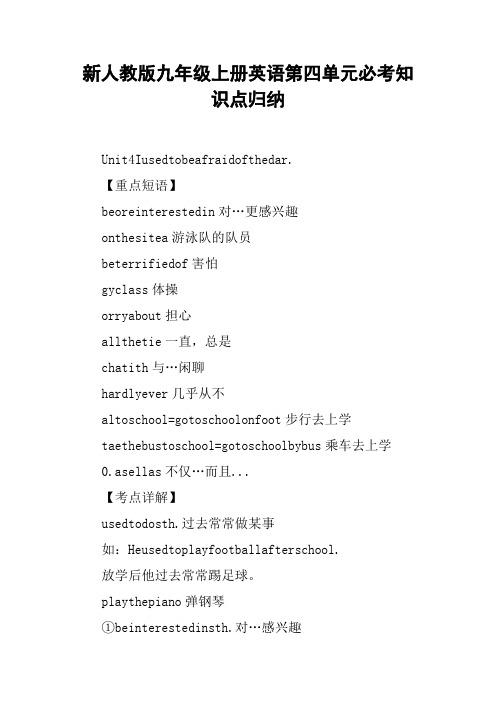Unit 4. I used to be afraid of the dar
- 格式:doc
- 大小:32.50 KB
- 文档页数:2

Unit4Iusedtobeafraidofthedark重点知识归纳Unit4Iusedtobeafraidofthedar.重点知识归纳解析【重点单词】huorousad有幽默感的;图silentad沉默的;helpfulad有用的,有帮助的:scoren&v.得分,进球。
interviev&n.面试,采访;darev.敢于;胆敢;privatead私人的,私密的。
requirev.需要;要求;Europeanad欧洲的;0.Britishad英国的;1.speechn.讲话;发言;antn.蚂蚁;3.insectn.昆虫influencen&v影响;proudad自豪的,骄傲的;seldoadv.不常,很少;failv.不及格,失败;generalad普通的,常规的;introductionn.介绍;【重点词组】usedto过去曾经beafraidofthedar惧怕黑暗frotietotie时常getgoodscores取得好的分数dealith对付,应对gettonsofattention得到大量的关注readboosonEuropeanhistory阅读有关欧洲历史的书Africanculture非洲文化bealone独处0.giveaspeechinpublic作一个公开演讲1.paintpictures画画benervousabouttests对考试感到紧张3.influencehisayofthining影响他的思维方式beproudof./taepridein为…感到骄傲beabsentfroclasses逃failtheexainations考试不及格aeadecision下决心talithsbinperson亲自找某人谈话toone’surprise使某人惊讶的是0.feelgoodaboutoneself对自己充满信心1.ageneralself-introduction一个简要的自我介绍2.inthelastfeyears在最近几年3.reainsilent保持沉默haveagreatinfluenceonsb对某人有很大的影响【重点句式】---youusedtobeshort,didn’tyou?---yes,Idid.---你过去个子矮,是吗?---是的,我是。

课题:Unit 4 I used to be afraid of the dark.第1课时学习目标:1、重点单词humorous(adj.)有幽默感的;滑稽有趣的;silent(adj.)不说话的;沉默的;(adj.)有用的;有帮助的;score(n.&v.)得分;进球2、重点词组used to过去曾经;be afraid of the dark惧怕黑暗;wear glasses戴眼镜;from time to time 时常;有时;such a good idea如此好的一个主意;get good scores取得好的分数3、重点句式(1)1.—You used to be short, didn’t you?你过去个子矮,是吗?—Yes, I did.是的,我是。
(2) —What’s he like now?他现在是什么样?—He’s tall now.他现在很高。
(3)Paula used to be really quiet. She was never brave enough to ask questions.葆拉以前很文静,她从来不够勇敢来问问题。
(4)It’s been three years since we last saw our primary school classmates.自从我们上次见到我们的小学同学以来已有三年了。
(5)It’s interesting to see how people have changed.看到人们怎样的变化真是很有趣。
重点难点:重点:used to do的用法。
难点: be used to do sth, be used to doing sth.和used to的区别。
导学设计:1. humorous adj. 有幽默感的; 滑稽有趣的The man is a humorous writer. 那个人是一个幽默的作家。
This story is full of humor. 这个故事很幽默。


新人教版九年级上册英语第四单元必考知识点归纳Unit4Iusedtobeafraidofthedar.【重点短语】beoreinterestedin对…更感兴趣onthesitea游泳队的队员beterrifiedof害怕gyclass体操orryabout担心allthetie一直,总是chatith与…闲聊hardlyever几乎从不altoschool=gotoschoolonfoot步行去上学taethebustoschool=gotoschoolbybus乘车去上学0.asellas不仅…而且...【考点详解】usedtodosth.过去常常做某事如:Heusedtoplayfootballafterschool.放学后他过去常常踢足球。
playthepiano弹钢琴①beinterestedinsth.对…感兴趣②beinterestedindoingsth.对做…感兴趣如:Heisinterestedinath,butheisn'tinterestedinspeaingEn glish.他对数学感兴趣,但是他对说英语不感兴趣。
interestedad感兴趣的,指人对某事物感兴趣,往往主语是人interestingad有趣的,指某事物/某人具有趣味,主语往往是物beterrifiedofsth.害怕……如:Iaterrifiedofthedog.beterrifiedofdoingsth.害怕做……如:Iaterrifiedofspeaing.spend动词,表示“花费金钱、时间”①spend…onsth.在某事上花费②spend…doingsth.花费去做某事如:Hespendstoouchtieonclothes.他花费太多的时间在衣着上。
Hespend3onthsbuildingthebridge.他花费了三个月去建这座桥。
tae:动词,有“花费时间”的意思,常用的结构有:Ittaessbtodosth.做某事花费某人多长时间。

初三英语Unit-4-I-used-to-be-afraid-of-the-dark课文及详解Unit 4 I used to be afraid of the darkLanguage Goal:Talk about what you used to be likeSection A1a Fill in the chart with words to describe people. Appearance 外表Personality 个性Tall 高个的Outgoing 外向的straight hair 直发Funny 滑稽的,有趣的Yes, I did.used to和would①used to和would都可表示过去的习惯或行为,常可换用。
When we were children we used to/would go skating very winter. 我们小时候每年冬天都去滑冰。
②used to含有较强的“今昔对比”的含义I do not swim so often as I used to我不像过去那样常游泳了。
而used to则可无时间状语used to do和be used to doing.①be used to 是“习惯于”某一客观事实和状态,不强调动作,to是介词,后面接名词或动名词,I am used to the weather here.我已经习惯于这里的天气了。
He is used to hard work. 他习惯于艰苦的工作。
②get(或become)used to指的是从不习惯到习惯这一过程的转变,另外,它往往包含着克服困难去适应的意思。
如:You will soon get used to the weather here.你会习惯于这里的天气的。
In the end, I got used to doing the hard work.最后,我终于习惯干苦活了。

一、短语归纳Used to 过去常常be afraid of害怕from time to time 时常such a great idea如此好的主意take up 开始从事turn red 变红deal with 对付,应付worry about为...担心not….any more 不再get tons of attention 得到太多的关注Fight on 继续奋斗a very small number of 极少数的.... at least 至少be alone独处in public 公开地give a speech作演讲on the soccer team 在足球队get good grades 取得好成绩be proud of 为。
骄傲move in with…搬来和。
一起住move in 搬进新居no longer 不再=not any loner be absent from classes 逃课in the last few years 在过去的几年里boarding school 寄宿学校in person 亲自change one’s life改变某人的生活to one’s surprise 令某人吃惊的是even though 尽管take pride in 为….感到自豪pay attention to…对….主意二、重点句型1.The head teacher advised his parents to talk with their son in person.2.They also told me that even though they couldn’t be there to take care of me…三、常考知识点及语法1.Mario, you used to be short, didn’t you? 考察反意疑问句2.What’s he like now? 他现在是什么样子相当于What do/does+主语+look like?3.helpful----------be helpful to4.She was always silent in class. 延伸——silent的名词及副词5.She still plays the piano from time to time.From time to time 意为时常,有时,相当于sometimes/at times6.This party is such a great idea!Such意为如此的,这样的,常用结构-----such+a/an+ adj +可数名词单数Such+adj+不可数名词Such+adj+可数名词复数区分so 及such ①So 修饰adj和adv such修饰n②So 修饰形容词的常用结构为“so+adj+a/an+可数名词单数;当句中名词为复数或不可数名词时,要使用such He is so lovely a boy that we all like him.It’s such fine weather that I’d like to have a walk.③当名词前有many/much/few/little时,只能用so 来修饰。
Unit 4 I used to be afraid of the dark. 重点知识I.重点词组1. used to 过去常常,曾经2. be afraid of the dark 惧怕黑暗3. from time to time 时常4. get good scores 取得好的分数5. deal with 对付,应对6.get tons of attention 得到大量的关注7.read books on European history 阅读有关欧洲历史的书 8. African culture 非洲文化9. be alone 独处 10. give a speech in public 作一个公开演讲 11. paint pictures 画画12.be nervous about tests 对考试感到紧张 13. influence his way of thinking 影响他的思维方式14.be proud of ./take pride in 为…感到骄傲 15. be absent from classes 逃课16.fail the examinations 考试不及格 17. to one’ surprise 使某人惊讶的是18.talk with sb in person 亲自找某人谈话 19. make a decision 下决心20.feel good about oneself 对自己充满信心 21. in the last few year在最近几年22.a general self-introduction 一个简要的自我介绍 23.take up doing sth. 开始做某事24.dare to do sth. 敢于做某事 25.not... any more / no longer 不再...... 26.all the time 一直,始终27.hang out 闲逛 28.be prepared to do sth. 准备好做某事 29.give up doing sth.放弃做某事30.the road to success 成功之路 31.in person 亲自,亲身 32.wear glasses 戴眼镜31.fight on 继续奋战 32.scary movies 恐怖片 33.be on the soccer team 在足球队34.feel good about oneself 自我感觉良好 35.make a decision to do sth. 决定做某事36.a boarding school 寄宿学校 37.break the rules 违反规定,犯规38.even though 即使 39.take care of =look after 照顾 40.miss classes 逃课41. remain/ keep silent 保持沉默 42. have a great influence on sb对某人有很大的影响II.解析◆used to的用法used to十动词原形,“过去常常干……”eg:He used to be a doctor. 他过去是一位医生。
Unit 4I used to be afraid of the dark.◆单词串烧An introduction to PaulaPaula is a 19-year-old Asian pop star.When she was in the primary school,she was humorous and dared to sing and give speeches in public.She also enjoyed singing in front of crowds.She was also never absent from class.And she seldom caused any problems.Because of her hard work,she had always got good scores in the examinations and her parents took pride in her.However,her mother passed away when Paula was 13.Her mother's death had influenced her a lot.She became silent and less interested in studying and school activities.She sometimes failed her examinations.Months later,her father talked with her in person.After that,Paula became as active as before.She made a decision to become a singer.Now she has achieved her dream,and she gets tons of attention everywhere she goes and there are always guards around her.Although she is busy all the time,she always spends a private day with her father every week.She loves her family deeply.Dream,courage and love are all required in our life.With them we can deal with everything well.◆必记单词humorous adj.有幽默感的高频helpful adj.有用的,有帮助的高频background n.背景silent adj.不说话的,沉默的高频score n.&v.得分,进球interview v.采访,面谈n.面试,访谈Asian adj.亚洲的n.亚洲人ton n.吨(pl.)大量,许多guard n.警卫,看守v.守卫,保卫European adj.欧洲(人)的高频n.欧洲人British adj.英国(人)的public n.民众adj.公开的,公众的seldom adv.不常,很少高频absent adj.缺席,不在examination n.考试,审查pride n.自豪,骄傲高频introduction n.介绍dare v.敢于,胆敢private adj.私人的,秘密的require v.需要,要求African adj.非洲(人)的n.非洲人speech n.讲话,发言ant n.蚂蚁influence v.&n.影响fail v.不及格,失败,未能(做到)高频exactly adv.确切地,精确地general adj.总的,普遍的n.将军◆重点短语from time to time时常,有时高频deal with对待,对付高频take pride in为……感到自豪高频take up开始从事(某事)高频tons of许多,大量be absent from缺席even though即使高频be afraid of害怕in public公开地高频in person亲身,亲自高频be proud of为……骄傲高频all the time总是,一直hang out闲逛make a decision做决定高频used to过去常常◆词形变换humorous adj.→humor n.幽默高频helpful adj.→help v. & n.帮助,帮忙silent adj.→silence n.沉默高频Asian adj. & n.→Asia n.亚洲高频European adj. & n.→Europe n.欧洲高频African adj. & n.→Africa n.非洲高频British adj. & n.→Britain n.英国absent adj.→absence n.缺席exactly ad v.→exact adj.精确的pride n.→proud adj.骄傲的,自豪的高频introduction n.→introduce v.介绍◆重点句子1.She was never brave enough to ask questions.她从来不够勇敢地去问问题。
人教版英语九年级Unit 4《I used to be afrd of the dark》全单元教学设计一. 教材分析人教版英语九年级Unit 4的主题是“I used to be afrd of the dark”,主要讲述了人们过去和现在的变化。
本单元包括两个部分:Part A和Part B。
Part A包含一个听力任务、一个口语任务和三个阅读任务,而Part B包含一个口语任务、两个阅读任务和一个写作任务。
教材内容丰富,旨在提高学生听说读写四项基本技能,同时培养他们的文化意识和跨文化交流能力。
二. 学情分析九年级的学生已经具备了一定的英语基础,能够运用所学知识进行简单的交流。
但是,他们在词汇、语法和听力方面还存在一定的困难。
因此,在教学过程中,教师需要关注学生的个体差异,充分调动他们的学习积极性,激发他们的学习兴趣。
三. 教学目标1.知识目标:学生能够掌握本单元的重点词汇和语法知识,正确运用一般过去时描述过去和现在的变化。
2.能力目标:学生能够在不同情境下运用所学知识进行听说读写操作,提高他们的语言运用能力。
3.情感目标:学生能够了解并尊重文化差异,培养跨文化交流的能力。
四. 教学重难点1.重点:本单元的重点词汇和语法知识,以及一般过去时的运用。
2.难点:一般过去时的运用,以及如何在实际情境中进行跨文化交流。
五. 教学方法1.任务型教学法:通过完成各种任务,激发学生的学习兴趣,提高他们的实践能力。
2.情境教学法:创设真实的情境,帮助学生理解并运用所学知识。
3.交际法:鼓励学生积极参与课堂交流,提高他们的口头表达能力。
六. 教学准备1.教师准备:备好相关教学材料,如PPT、听力材料、阅读材料等。
2.学生准备:预习本单元内容,完成相关的自主学习任务。
七. 教学过程1.导入(5分钟)教师通过提问方式引导学生回顾上一单元学过的内容,激发学生的学习兴趣。
例如:“Do you remember what we learned in the last unit? How was your weekend?”2.呈现(10分钟)教师通过展示PPT或实物,呈现本节课的主题“I used to be afrd ofthe dark”,引导学生关注一般过去时的运用。
Unit 4 I used to be afraid of the dark.(导学案)
Section A 4a-4c 课时:1
学习目标:
复习本单元used to结构,描述自己或他人过去与现在的外貌和性格的变化;完成4a-4c练习。
学习重点,`难点:
运用used to结构,描述自己或他人过去与现在的对比.
学法指导:自学---讨论-----语法学习----巩固.
自主预习:
1.朗读Grammar Focus的句子,并翻译。
2.独立完成4a、4b 和4c,完成后小组内核对答案。
探究合作:
1.辨析used to do sth.,be used to do sth.和be/get used to doing sth.。
I’m used to __________ (teach) children English. 我习惯于教孩子们英语。
2.I’ be afraid of同义短语:be terrified of
a.I used to be terrified of (speak) in public.
b.Most girls are afraid of (catch)snakes.
c.She is afraid (go) out when it rains heavily
【拓展】(1) be afraid to do..不敢做… (2)I’m afraid that ...恐怕...
(3)I’m afraid so.恐怕如此(4) I’m afraid not.恐怕不是。
(1)She is afraid _____ ______ ______ at night.(不敢晚上出去)
( 2 ) _____ ______ _______ she can’t come . 恐怕她不能来了
【达标检测】
1.Jim is afraid of (fly).
2.2.He feels (terrify) before he gets on the plane
3. She _____ listen to classical music, but now she dancing(use)
4 .He in the sun, but now he at night (use, read)
5.我的爷爷习惯早起。
6.My grandpa’s ______ _______ getting up early
7...你的妈妈现在是什么样子?
_____ your mother _____ mow?
Unit 4 I used to be afraid of the dark.(教学反思)
我先简单介绍一下本节课的授课内容和环节。
本节课主要讲了used to的用法,指过去常常做某事。
整节课,我首先采用图片导入,用学生熟悉的人物的过去的照片,通过现在与过去的对比,让他们谈论一个人的前后变化。
并引出used to的用法。
在学会了用法后,出示了电影明星小时候的照片,让大家描述图片中人物过去的相貌和性格。
请同学们猜猜他是谁。
之后,六人一组,请同学们拿出他们带的照片,描述照片中人物过去的相貌和性格,其他同学猜他们是谁,小组活动。
接下来的环节是谈谈我最熟悉的人。
可以是老师,同学,父母,明星等。
谈谈他们以前和现在的变化。
然后选出本组变化最大的人物。
等熟练used to的用法后,我找了一个同学,谈论他的英语学习的方法,通过小组活动,让学生和同伴交流以前和现在的英语学习方法,并总结出最好的,写一篇文章。
最后出了几道测试题来测试他们的学习效果。
家庭作业我布置的是让学生感受自己身边变化最大的人,把他的变化及原因写出来,通过交流比赛,选出最好的文章。
总结本节课,优点是:我采用了英语TKT中学到的“任务型教学”。
通过给学生设置问题,让他们通过思考来解决,因为整节课的设计比较贴近生活,所以整堂课的气氛十分活跃,学生们参与表现的积极性非常高,这是我们在初三授课过程中难得出现的状态。
我想这多少也体现了“在学中用,在用中学”的教学理念吧。
美中不足的是,还是有个别学生的自控能力比较差,所以从外观看,尤其是小组活动时,课堂显得有点不太严肃。
成绩差的学生只是感受到学习的快乐氛围,却融入不了其中。
这也是本节课很遗憾的地方。
但从检测的效果看,学生对于英语学习部分的非谓语动词引导的句子掌握不是太好。
如:he thinks watching English movies is a bad way because he can watch the actors say the words.动名词作主语的句子掌握的有点差。
所以,我也在试着调整自己的备课,将授课的内容与课堂容量再扩大一些,让学生有更多的机会掌握更多的知识。
通过最近的小测试,我也发现自己在教学中,与其他老师相比,有很大的不足。
就是不善于总结知识点,没有意识将知识点与中考结合。
所以在以后的备课中,我也计划着多做几套中考题,了解一下中考的动态与趋势,让学生提前感受到中考的氛围,我想也是很有必要的。